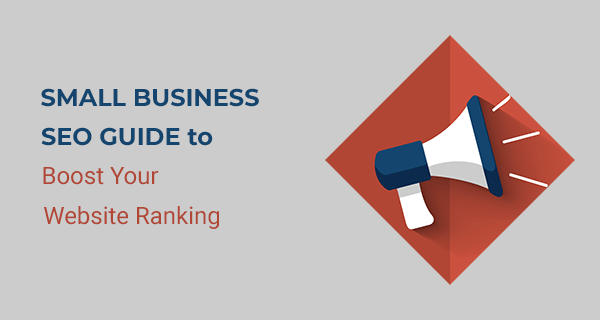Last Updated on by Azib Yaqoob
Promoting a small business website is challenging at times when you don’t have much content on the website. By using SEO, many small businesses have increased their leads and customers. In this Small business SEO guide, I will share techniques that also worked for many of my clients.
How SEO Helps Small Businesses?
New small businesses have limited marketing budgets.
I know there are countless other ways to promote a small business online. Yet, almost all of them are pretty expensive. So, in my opinion, investing your time in learning basic SEO concepts can help you a great deal to boost your site traffic for free. Using other expensive marketing strategies will make more sense when you have many customers.
When my clients hire me to optimize their SEO, they are clueless about SEO. That’s the only reason I am writing this guide to help business owners grow their sales.
Most online businesses fail because of poor marketing strategies. SEO is quite an effective way to promote your business online. It should be a crucial part of your online marketing strategy.
Here’s how to Boost Your Small Business SEO
Using these techniques, you can increase any small business site’s rankings and traffic. I apply this same strategy to help my clients rank better in the search.
Develop an SEO Strategy
A focused SEO strategy will help you get traffic on the site quickly. It is quite essential always first develop an SEO strategy. Here are some best practices to create a small business SEO strategy.
- Find out keywords to add to your site copy. Keywords are queries that your potential customers search on Google to find help/product.
- Find out your top business competitors. You can find them by searching them on Google by entering business-focused keywords.
- Define how you would use keywords throughout your website.
- Create a link-building strategy to earn more backlinks.
Perform a Competitors Analysis
Please find out your competitors’ SEO strategy; it will help you understand how they promote their business online. It will give you many new ideas to grow your small business too. Any small business must invest in gathering competitors’ data.
How exactly should you perform an SEO competitor analysis?
- Find top websites on the keywords that you want to rank your website.
- For example, if you target a coffee shop in NYC, you should check which websites appear in the top search results.
- You should find how often they use a particular keyword on the page, their content strategy, and their SEO techniques. You can then apply those to outrank them.
- You can also use SEO competitors’ research tools to gather competitor’s data more efficiently and quickly.
Keyword Research
Keyword research should be an important part of any small business SEO. It is challenging to attract organic traffic without proper keywords inside your copy.
Make sure that you are using correctly researched keywords. Always use keywords that have low competition. I have compiled a list of the best free keyword research tools that you can use to find good keywords.
I use Semrush, Google Search Console, Google auto-suggest, and Keyword planner to find keywords. Semrush is quite expensive for a small business, but I can assure you, you can also find great keywords using your Google Search Console “Search Performance” report.
Similarly, you can use Keyword Planner. It is a free tool and can give you a lot of valuable keywords. I have written a detailed tutorial on finding keywords using a keyword planner; make sure to check that out.
SEO Audit
Every small business should perform a site-wide audit. It will help you find out errors that are holding your website back.
Find new opportunities to optimize your site further. There’s always room for improvement.
You can use some of these tools to perform a site-wide SEO audit.
- Woorank
- SEOsitecheckup
- SEOPTIMER
If you want a thorough SEO audit and you have prior experience with SEO, then check out this tutorial on how to perform a manual SEO audit.
On page SEO
You can do many things to optimize your small business on-page SEO. Following these on-page SEO tips, you can rank any low-competitive page quite easily.
- Use a primary keyword in the HTML H1 tag.
- Use SEO-friendly URLs throughout the website.
- Link internal pages and posts together so that Google can easily crawl and index all pages.
- Use keywords in the first few paragraphs of a web page.
- Create bullet points whenever possible.
- Optimize website speed to load faster on every device.
Speed Optimization
Google prefers fast websites to appear on the first page of Google. If your website is too slow, it will not perform to its full potential in search results. I recently compared WP Super Cache and WP Fastest Cache; make sure to read, mainly if you use WordPress.
Speed optimization is essential if your potential customers use your keywords to search your business on mobile. Using unoptimized images can slow down websites. You can easily compress images without losing quality, even after uploading them to your site.
You can use these tools to check out your current page load speed:
- Google PageSpeed Insights
- Pingdom Speed Test
Schema Markup
Schema markup is perfect for local website SEO. Using schema markup on your website will help Google show users better and more informative search results. It will also improve your website ranking and CTR.
Using WordPress, you can check out these schema-rich snippets of WordPress plugins.
Internal Links
Internal links are HTML links created on the same website to connect to different pages. It enhances the navigation of your website and allows visitors to navigate through your website easily.
You must provide full navigation to your service page, product, about, contact, and homepage.
Always nofollow all external links on your website and when creating links to your website’s internal pages, ensure they are always dofollow backlinks.
Google Search Console
When you have completed your website, you might need to check if there’s any major site structure issue that can break your website functionality or stop it appear in search results.
The Google search console helps webmasters find sitemap errors, 404 errors, 301 redirection errors, duplicate Meta tags, and crawl errors. You can use the Google search console to check how Google bots see your website. By accessing the Google Search Console account, you can fix errors reported by GSC. Doing so will boost your website’s ranking in search.
Sitemap
What is a sitemap?
In simple words, a sitemap in modern terms is an XML file that defines a website structure and URL structure to search bots. Search bots then crawl these URLs and index them to their database.
You can create a sitemap on WordPress using different plugins. After that, you can submit a sitemap to Google and Bing.
How to submit a sitemap to Bing Webmaster Tools?
- Create an account on Bing
- First, you must register your website property in Bing Webmaster Tools.
- After that, you can copy your XML sitemap URL and submit it to Bing.
How to submit a sitemap to Google Search Console?
- Create an account on Google Search Console.
- Verify your website property in Google Search Console.
- You can easily submit your XML sitemap by copying the URL and pasting it to GSC.
Google Analytics
Google Analytics allows you to measure your website traffic. It has different uses and can be very beneficial to track your small business’s SEO efforts. It will help you learn:
- About your website visitors
- The activity of visitors to your website
- identify good and poorly performing pages
Create Web 2.0 Blogs
Many platforms provide free blogging and website setup. Like WordPress.com, Tumblr, medium, and so on. Use these platforms to write blog posts on topics relevant to your small business.
Make sure that it is helpful to your readers and that you are offering some value to the reader. Don’t forget to leave a backlink to your website in the post.
Web 2.0 blogs are an incredibly reliable way to improve your website ranking. Here are some of the web 2.0 blogs on which you can create a blog and start writing:
- Medium
- WordPress.com
- Tumblr
- Weebly
- Blogger
Create Social Profiles
There are two benefits of creating social profiles:
- It will improve your business’s online reputation.
- Improvement in ranking and website authority.
Create social profiles for your business so users can easily find you. If there is an option to share your website on your profile, you must use that option. Add your website to your social profile.
Write Guest Posts
Writing a guest blog post on the authority website in your niche has many benefits.
- It will bring direct traffic from that blog to your business website.
- A backlink from a high domain authority website will boost your website’s ranking.
Find out top bloggers who cover topics relevant to your business. For example, if you sell shoes online, then approach fashion blogs to write a post about fashion. You can pitch them your blog idea and get it published.

Create and Verify Google My Business Listing
Google My Business listing is a must-have if you are a local business. It will help people find your business location through Google maps and search results.
Google Business listing will attract new customers. Your potential customers will search your business location if you prefer on-site visits. I recommend you to use Google My business.
Submit Your Small Business to Local Directories
You should submit your website to local business directories if your online business targets a local audience. It will improve your website ranking, and you will also get some leads from these directories.
If you want to submit your website, these are some of the widely known local business directories:
- Yellow pages
- Yelp
- Local.com
Manage Your Small Business Online Reputation
Online reputation management is managing search results and reviews of a business that shows up in search results. To get leads, you should improve your online business reputation.
Here is a step-by-step guide to improving your online reputation.
I hope you find this post helpful. If you have any questions, please feel free to contact me.

